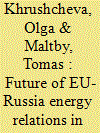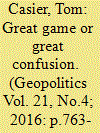|
|
|
Sort Order |
|
|
|
Items / Page
|
|
|
|
|
|
|
| Srl | Item |
| 1 |
ID:
150533


|
|
|
|
|
| Summary/Abstract |
In 2013, there was a joint commitment to “long term strategic EU-Russia energy cooperation”.11. EU/RF Roadmap, ‘Roadmap EU-Russia Energy Cooperation until 2050‘, European Commission and Russian Government, March 2013, p. 4, available at .
View all notes
Whilst centred on oil and gas, it is noted that “the importance of renewables for EU-Russia energy relations should grow too”,22. Ibid., p. 21.
View all notes
and that for energy efficiency, “cooperation potential is immense and could… contribute to the objective of a Pan-European energy area”.33. Ibid., p. 26.
View all notes
Given this shared objective, this article analyses EU and Russian energy decarbonisation policy objectives and considers the potential for a supplementary trade relationship based on renewable energy flows and decarbonisation-related technology, as well as the implications for existing energy trade. Despite declarative statements of mutual interest, shared objectives and cooperation in decarbonisation policy, there has been very limited cooperation by early 2016. The EU has set ambitious plans to decarbonise its economy and energy sector by 2050. However, in Russia energy policy is dominated by hydrocarbon exports, decarbonisation targets are modest, and there are major problems with their implementation. The drivers of EU and Russian energy policies are evaluated, and the argument advanced is that different understandings of energy security and types of energy governance provide major obstacles to decarbonisation cooperation and trade. However, it is argued that ideas about energy policy and security are contested and subject to change and there exists significant potential for mutual gain and cooperation in the longer term.
|
|
|
|
|
|
|
|
|
|
|
|
|
|
|
|
| 2 |
ID:
150530


|
|
|
|
|
| Summary/Abstract |
This article explains why a considerable part of the International Relations literature frames highly complex energy relations between the EU and Russia in terms of simple, exclusive geopolitical intentions. Drawing on Construal Level Theory, it addresses the gap between immediate interaction between various private and public actors with their own agendas and individual intentionalities and assumed collective geopolitical intentionalities. Because of the degree of abstraction, collective motivations are attributed to actors like Russia and the EU. This attribution risks to be subject to bias. It is argued that higher psychological distance increases the likelihood of more radical and ideologised framing. These abstract schemes do not follow from the endogenous energy dynamics but are function of a broader logic of competition which has characterised EU-Russia relations.
|
|
|
|
|
|
|
|
|
|
|
|
|
|
|
|
|
|
|
|
|